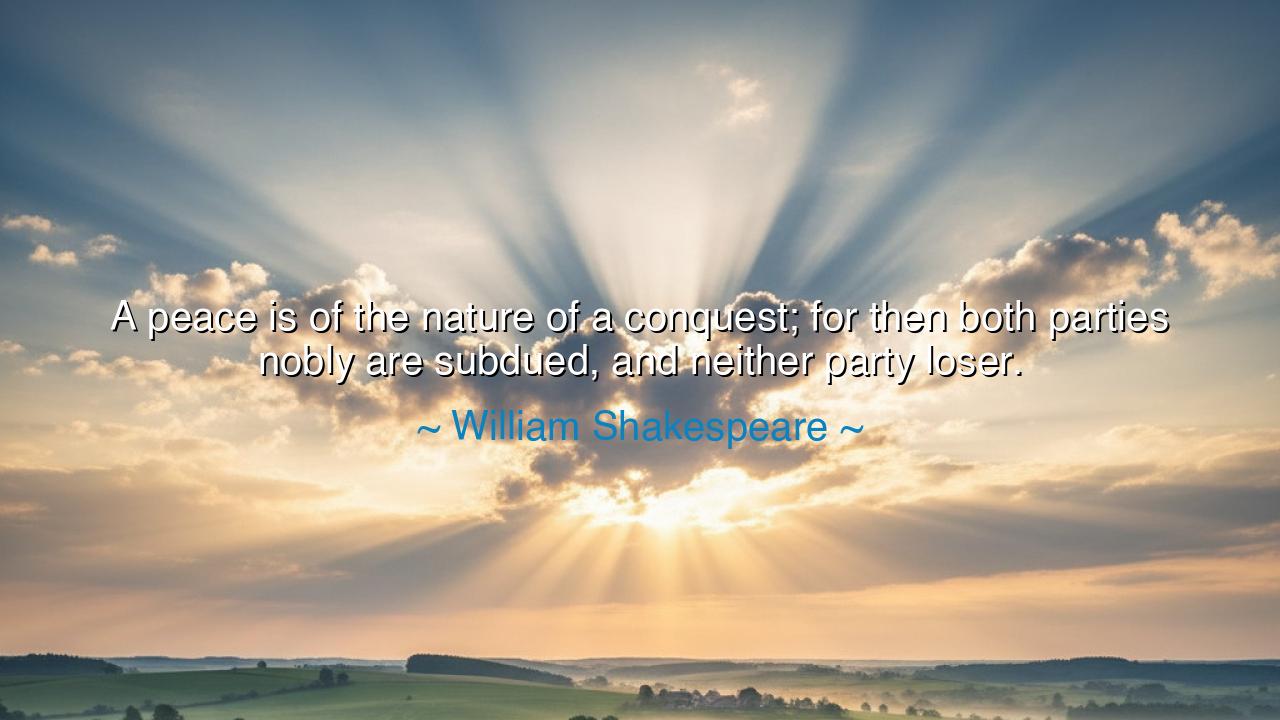
A peace is of the nature of a conquest; for then both parties
A peace is of the nature of a conquest; for then both parties nobly are subdued, and neither party loser.






William Shakespeare, master of the human heart, once wrote: “A peace is of the nature of a conquest; for then both parties nobly are subdued, and neither party loser.” In this single thought he reveals a paradox both noble and eternal: that true peace is not weakness, nor is it surrender, but a victory greater than the spoils of war. It is a conquest in which the battlefield is not drenched in blood, but in humility; where both sides lay down arms not out of defeat, but out of wisdom.
To call peace a conquest is to upend the ordinary mind. Men often think conquest means domination, one side triumphant and the other crushed. But Shakespeare points to a higher law: the greatest conquest is not over another, but over the pride, fear, and hatred within ourselves. In peace, both parties are subdued—not by force of arms, but by the recognition of shared humanity. This subduing is not shameful, but noble, for it allows each to rise unbroken, with honor intact, and without the endless bitterness that follows war.
The ancients too spoke of this wisdom. Heraclitus declared, “War is the father of all things,” yet he spoke of conflict as the forge of harmony, not its destruction. Marcus Aurelius, emperor and Stoic, often reminded himself that to forgive and reconcile is a greater strength than to conquer provinces. Even the teachings of Christ echo here: Blessed are the peacemakers, for they shall be called the children of God. Shakespeare, who drank from these wells of thought, crafted his line as a beacon—peace is not a loss but a double triumph.
History gives us shining proof. Consider the Treaty of Westphalia in 1648, which ended the Thirty Years’ War in Europe. After decades of slaughter, famine, and ruin, the warring states agreed to recognize each other’s sovereignty. Each gave ground, each accepted limits, and so all survived. Neither side emerged as “victor” in the traditional sense, but the peace itself was the conquest, preserving nations that might otherwise have perished. In the humility of compromise lay the noblest victory, one greater than crowns and territories.
Or recall the meeting of Nelson Mandela and F.W. de Klerk in South Africa. Decades of hatred, apartheid, and violence seemed to demand a war without end. Yet through courage and vision, both leaders chose reconciliation over revenge. Each was subdued—Mandela in restraining the fury of the oppressed, de Klerk in surrendering privilege—but in that mutual restraint, neither was a loser. Instead, a nation was reborn, proving Shakespeare’s truth that the noblest conquest is found in peace.
The lesson for us, O seekers, is this: when faced with conflict, do not ask only, “How may I win?” but also, “How may we both rise?” For in quarrels great and small, from the disputes of nations to the arguments of families, the path of peace is not weakness but the highest strength. To yield in pride, to forgive in anger, to choose harmony over triumph—these are victories invisible to the shallow eye but radiant to the wise.
Practical action follows. In your own life, when disputes arise, pause before demanding victory. Seek instead the ground where both may stand, where dignity is preserved and bitterness dissolved. Practice listening more than speaking, yielding where possible, and standing firm only where principle demands. Remember always that in true peace, you do not leave the other defeated but joined, and in that joining you, too, are made whole.
Thus Shakespeare’s words endure across centuries: “A peace is of the nature of a conquest; for then both parties nobly are subdued, and neither party loser.” Let us take this as a guiding star. For though the world honors the conqueror with banners and songs, it is the peacemaker who conquers without destruction, and whose victories endure long after empires have turned to dust.






AAdministratorAdministrator
Welcome, honored guests. Please leave a comment, we will respond soon